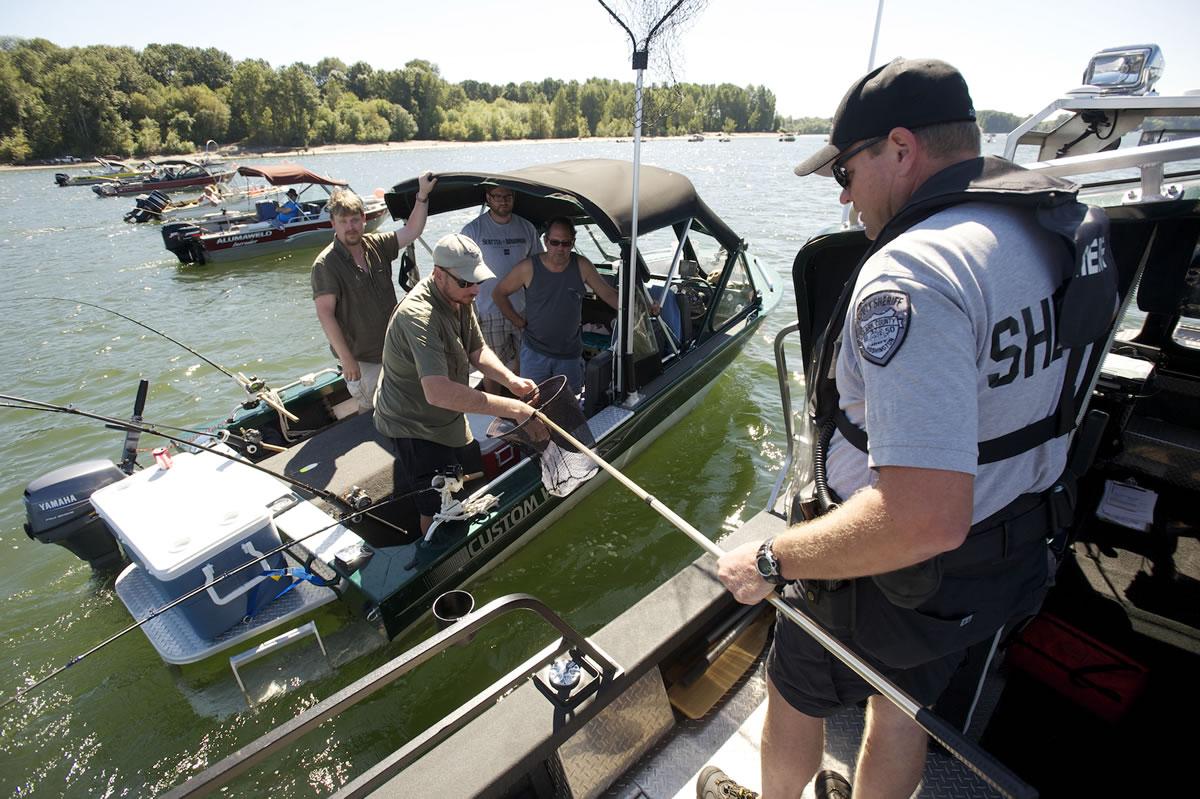WOODLAND — Half a dozen hoglines stretched out from the Washington shore and crept into the edge of the Columbia River channel just downstream of the Lewis River.
“This is one of our problem areas and it will get worse than this,” said Clark County sheriff’s deputy Todd Baker, patrolling the Columbia by boat. “The ships coming downstream have to make a turn here.”
Baker nodded toward the boat on the outside of the anchored line of fall chinook salmon fishermen.
“They’re in the channel right now,” he said. “If a ship comes by, they are going to have to move.”
Baker typed the boat’s registration numbers into the computer and learned it was registered to a Moses Lake owner.
“Often it’s out-of-area fishermen,” he said. “The ones around here have been checked so many times they know.”
Fall chinook season is a busy time of year on the Columbia River. Thousands of anglers are anchored in the deeper stretches of the river trying to catch a few of the 678,600 chinook working their way upstream this year.
The deeper spots have the cool water preferred by the chinook, but also overlap with much of the shipping channel.
Baker and deputy Shaun Robertson patrolled the river from Vancouver to Woodland Sunday as part of Operation Make Way, a joint effort by law enforcement and other boating interests to avoid accidents on the lower Columbia.
The Clark County Sheriff’s Office has a boat on its 50 miles of the Columbia River daily from Memorial Day weekend to Labor Day weekend.
Baker said typically they make 10 to 15 boardings a day at this time of year.
Boardings might be for incorrectly displayed registration numbers, skiing without an observer, an overloaded boat or too few life jackets.
Baker said the sheriff’s office also will enforce fish and wildlife regulations including the new bistate rule requiring anglers to use barbless hooks.
Anchoring in the channel is not illegal, but obstructing navigation is against the law. A citation for negligent boating carries a $300 fine in Washington.
Sea-going ships travel downstream at 15 to 18 knots through the Clark County stretch of the Columbia, Baker said.
“They can’t stop,” he said. “Normally, by the time you hear the five (horn) blasts it’s almost too late. You have to leave the anchor there and get out of the way. Your anchor might be gone when you get back, but it’s a lot better than dying.”
There’s even an inexpensive smart-phone application called Marine Traffic, which boaters can use to provide the status of big ships on the Columbia, he said.
“They would know where the big ships are and when they are going to pass through,” Baker said. “It’s very important to always maintain a proper lookout while boating.”
Potential conflict between sport fishermen and commercial vessels is an issue throughout the lower Columbia.
The biggest areas of concern are from Buoy 10 to Tongue Point near Astoria and the Rainier-Longview stretch, according to Lt. Sarah Pulliam, deputy enforcement chief, U.S. Coast Guard Sector Columbia River.
The Coast Guard’s maximum penalty for failure to take appropriate action in narrow channels is $6,500.
Baker issued the Moses Lake boater warnings for improper display of his registration numbers and no registration paper on board. He let one of the anglers slide on failure to have an $8.25 Columbia River Salmon and Steelhead Endorsement.
But the lack of a throwable device in case someone falls overboard generated an $87 ticket.
“That’s an automatic ticket,” Baker said.
Boating safety efforts are paying off, he added.
“Most of the fishermen are pretty good with their equipment,” he said. “I see more people wearing inflatable life jackets, which is nice.”




